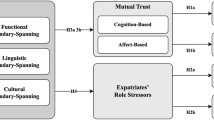Abstract
As organizations globalize, culturally based variation in the ways employees conceptualize their relationships with their employers increases in importance. In the competition for talent, organizations must understand employee preferences and expectations regarding their treatment by the firm. Recently, culture's influence on the psychological contract (individual perceptions of employer obligations) has been noted with regard to the extent that employees perceive their psychological contracts as relational or transactional. We provide results from a survey conducted in a multinational corporation (MNC) indicating that the cultural value of collectivist orientation likely has its effect on the psychological contract through beliefs about the nature of social exchange. Data were consistent with creditor exchange ideology (appropriateness of giving more than has been received) mediating the relationship between collectivist orientation and perceptions of a relational psychological contract. By examining this relationship empirically, we go beyond the demonstration of cultural effects to describe an intermediate mechanism through which culture operates. Exchange norms are likely to play a mediating role in a variety of cross-cultural relationships, and may be used by managers as a lever to improve relationships with employees, as opposed to engaging in attempts to change individual cultural orientation.
Similar content being viewed by others
References
Bontempo, R., & Rivero, J. C. 1992. Cultural variation in cognition: The role of self-concept in the attitude behavior link. Paper presented at the annual meeting of the Academy of Management, Las Vegas, August.
Boyacigiller, N. A., & Adler, N. J. 1991. The parochial dinosaur: Organizational science in a global context. Academy of Management Review, 16 (2): 262–290.
Brockner, J., Chen, Y. R., Mannix, E. A., Leung, K., & Skarlicki, D. P. 2000. Cultural and procedural fairness: When the effects of what you do depend on how you do it. Administrative Science Quarterly, 45 (1): 138–159.
Cronbach, L. J., & Gleser, G. C. 1965. Psychological tests and personnel decisions. Urbana, IL: University of Illinois Press.
De Vos, A., Buyens, D., & Schalk, R. 2003. Psychological contract development during organizational socialization: Adaptation to reality and the role of reciprocity. Journal of Organizational Behavior, 24 (5): 537–559.
Eisenberger, R., Cotterell, N., & Marvel, J. 1987. Reciprocation ideology. Journal of Personality and Social Psychology, 53 (4): 743–750.
Evans, P., Doz, Y., & Laurent, A. 1989. Human resource management in international firms. London: Macmillan.
Fischer, R., & Mansell, A. 2009. Commitment across cultures: A meta-analytical approach. Journal of International Business Studies, 40 (8): 1339–1358.
Fiske, A. P. 1991. Structures of social life: The four elementary forms of human relations. New York: Free Press.
Fock, H., Hui, M. K., Au, K. Y., & Bond, M. H. 2012. Moderation effects of power distance on the relationship between types of empowerment and employee satisfaction. Journal of Cross-Cultural Psychology, advance online publication 3 May; doi: 10.1177/0022022112443415.
Goodwin, R., & Tang, D. 1991. Preferences for friends and close relationships partners: A cross-cultural comparison. Journal of Social Psychology, 131 (4): 579–581.
Horwitz, F. M., Chan, T. H., & Quazi, H. A. 2003. Finders, keepers? Attracting, motivating, and retaining knowledge workers. Human Resource Management Journal, 13 (4): 23–44.
Hui, C., Lee, C., & Rousseau, D. M. 2004. Psychological contract and organizational citizenship behavior in China: Investigating generalizability and instrumentality. Journal of Applied Psychology, 89 (2): 311–321.
Kickul, J., & Lester, S. W. 2001. Broken promises: Equity sensitivity as a moderator between psychological contract breach and employee attitudes and behavior. Journal of Business and Psychology, 16 (2): 191–217.
Kickul, J., Lester, S. W., & Belgio, E. 2004. Attitudinal and behavioral outcomes of psychological contract breach: A cross-cultural comparison of the United States and Hong Kong Chinese. International Journal of Cross-Cultural Management, 4 (2): 229–252.
Kim, K. I., Park, H. J., & Suzuki, N. 1990. Reward allocations in the United States, Japan, and Korea: A comparison of individualistic and collectivistic cultures. Academy of Management Journal, 33 (1): 188–198.
King, W. C., & Miles, E. W. 1994. The measurement of equity sensitivity. Journal of Occupational and Organizational Psychology, 67 (2): 133–142.
Kirkman, B. L., & Shapiro, D. L. 2001. The impact of cultural values on job satisfaction and organizational commitment in self-managing work teams: The mediating role of employee resistance. Academy of Management Journal, 44 (3): 557–569.
Levinson, H., Price, C. R., Munden, K. J., Mandl, H. J., & Solley, C. M. 1963. Men, management and mental health. Cambridge, MA: Harvard University Press.
Luo, Y. 2002. Building trust in cross-cultural collaborations: Toward a contingency perspective. Journal of Management, 28 (5): 669–694.
Markus, H. R., & Kitayama, S. 1991. Culture and the self: Implications for cognition, emotion, and motivation. Psychological Review, 98 (2): 224–253.
Oyserman, D., Coon, H. M., & Kemmelmeier, M. 2002. Rethinking individualism and collectivism: Evaluation of theoretical assumptions and meta-analyses. Psychological Bulletin, 128 (1): 3–72.
Parks, J. M., & Schmedemann, D. A. 1994. When promises become contracts: Implied contracts and handbook provisions on job security. Human Resource Management, 33 (3): 403–423.
Parzefall, M.-R. 2008. Psychological contracts and reciprocity: A study in a Finnish context. International Journal of Human Resource Management, 19 (9): 1703–1719.
Podsakoff, P. M., & Todor, W. D. 1985. Relationships between leader reward and punishment behavior and group processes and productivity. Journal of Management, 11 (1): 55–73.
Podsakoff, P. M., MacKenzie, S. B., Lee, J.-Y., & Podsakoff, N. P. 2003. Common method biases in behavioral research: A critical review of the literature and recommended remedies. Journal of Applied Psychology, 88 (5): 879–903.
Preacher, K. J., & Hayes, A. F. 2008. Asymptotic and resampling strategies for assessing and comparing indirect effects in multiple mediator models. Behavior Research Methods, 40 (3): 879–891.
Putnam, R. D. 2007. E pluribus unum: Diversity and community in the twenty-first century: The 2006 Johan Skytte prize lecture. Scandinavian Political Studies, 30 (2): 137–174.
Ralston, D. A., Lee, C. H., Perrewe, P. L., Van Deusen, C., Vollmer, G. R., Maignan, I., Tang, M., Wan, P., & Rossi, A. M. 2010. A multi-society examination of the impact of psychological resources on stressor-strain relationships. Journal of International Business Studies, 41 (4): 652–670.
Restubog, S. L. D., Bordia, P., & Tang, R. L. 2007. Behavioral outcomes of psychological contract breach in a non-Western culture: The moderating effect of equity sensitivity. British Journal of Management, 18 (4): 376–386.
Ritter, B. A., & Lord, R. G. 2007. The impact of previous leaders on the evaluation of new leaders: An alternative to prototype matching. Journal of Applied Psychology, 92 (6): 1683–1695.
Rousseau, D. M. 1995. Psychological contracts in organizations. Thousand Oaks, CA: Sage.
Rousseau, D. M., & Schalk, R. (Eds) 2000. Psychological contracts in employment: Cross-national perspectives. Thousand Oaks, CA: Sage.
Sanchez-Burks, J., Nisbett, R. E., & Ybarra, O. 2000. Cultural styles, relationship schemas and prejudice against out-groups. Journal of Personality and Social Psychology, 79 (2): 174–189.
Song, L. J., Tsui, A. S., & Law, K. S. 2009. Unpacking employee responses to organizational exchange mechanisms: The role of social and economic exchange perceptions. Journal of Management, 35 (1): 56–93.
Spencer, S. J., Zanna, M. P., & Fong, G. T. 2005. Establishing a causal chain: Why experiments are often more effective than mediational analyses in examining psychological processes. Journal of Personality and Social Psychology, 89 (6): 845–851.
Suchman, M. C. 1995. Managing legitimacy: Strategic and institutional approaches. Academy of Management Review, 20 (3): 571–610.
Thomas, D. C., & Au, K. 2002. The effect of cultural differences on the behavioral response to low job satisfaction. Journal of International Business Studies, 33 (2): 309–326.
Thomas, D. C., Au, K., & Ravlin, E. C. 2003. Cultural variation and the psychological contract. Journal of Organizational Behavior, 24 (5): 451–471.
Triandis, H. C. 1995. Individualism and collectivism. Boulder, CO: Westview.
Triandis, H. C., & Suh, E. M. 2002. Cultural influences on personality. Annual Review of Psychology, 53 (1): 133–160.
Triandis, H. C., Bontempo, R., Villareal, M. J., Asai, M., & Lucca, N. 1988. Individualism and collectivism: Cross-cultural perspectives on self-ingroup relationships. Journal of Personality and Social Psychology, 54 (2): 323–338.
Tse, D. K., Lee, K., Vertinsky, I., & Wehrung, D. A. 1988. Does culture matter? A cross-cultural study of executives' choice, decisiveness, and risk adjustment in international marketing. Journal of Marketing, 52 (4): 81–95.
Yang, L.-Q. et al. 2012. Individualism-collectivism as a moderator of the work demands-strains relationship: A cross-level and cross-national examination. Journal of International Business Studies, 43 (4): 424–443.
Zhao, H., Wayne, S. J., Glibkowski, B. C., & Bravo, J. 2007. The impact of psychological breach on work-related outcomes: A meta-analysis. Personnel Psychology, 60 (3): 647–680.
Acknowledgements
This research was supported by a grant from the Social Science and Humanities Research Council of Canada.
Author information
Authors and Affiliations
Corresponding author
Additional information
Accepted by David A. Ralston, Consulting Editor, 23 May 2012. This paper has been with the authors for four revisions.
APPENDIX
APPENDIX
TRANSACTIONAL AND RELATIONAL PSYCHOLOGICAL CONTRACT AND EXCHANGE IDEOLOGY ITEMS
Transactional Contract
-
1)
Compensate me based on what I do for company name.
-
2)
Share resources with employees who deserve them.
-
3)
Treat me appropriately with regard to my rank in the company name organization.
-
4)
Share company name's positive outcomes with employees if they have contributed to them.
-
5)
Evaluate my contribution compared to that of others, and treat me accordingly.
-
6)
Pay as much attention to my contributions as anyone else's.
-
7)
Compensate me based on what other companies do for similar employees.
Relational Contract
-
1)
Create a sense of community among employees.
-
2)
Protect my well-being.
-
3)
Support me in matters outside of work.
-
4)
Look out for me no matter how well or poorly company name is doing.
-
5)
Be responsible for me.
-
6)
Employ me as long as I make a useful contribution.
Reciprocation Wariness
-
1)
The most realistic policy is to take more from others than you give.
-
2)
It generally pays to let others do more for you than you do for them.
-
3)
In the long run, it is better to accept favors than to do favors for others.
Creditor Ideology
-
1)
If someone does something for you, you should do something of greater value for him or her.
-
2)
If someone goes out of their way to help me, I feel as though I should do more for them than merely return the favor.
-
3)
If someone does you a favor, you should do even more in return.
Rights and permissions
About this article
Cite this article
Ravlin, E., Liao, Y., Morrell, D. et al. Collectivist orientation and the psychological contract: Mediating effects of creditor exchange ideology. J Int Bus Stud 43, 772–782 (2012). https://doi.org/10.1057/jibs.2012.17
Received:
Revised:
Accepted:
Published:
Issue Date:
DOI: https://doi.org/10.1057/jibs.2012.17




